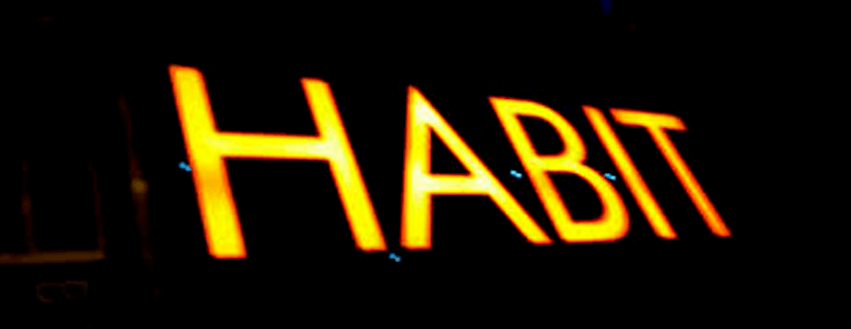
Most people use "Brute Force" to change something!!
They want instant gratification, I want it now. They are prepared to wait for a long term change.
Realise there is a short cut you can take and also have long term effects...
Take One Scenario:
“I have a bad habit of interrupting people when they are speaking”

You try repeating to yourself over and over...
“I will hold my tongue and not speak. I can do this, I can do this.”
That lasts probably the first two times a person saying something you object to, before you totally speak over the top of them and regret the whole experience.
What is going on here?
Why can’t we just change this behavior instantly and be done with it and move on?
What’s usually the case is you are focusing on the wrong part of changing your habit.
All habits have 3 stages:
Charles Duhigg in his book “The Power of Habit” explains the Habit Loop;
We have a Cue – Routine – Reward, below is a diagram from his website – How habits work showing how the loop works

You are changing what’s called the "Routine" without having a full understanding of what your Cue and Reward is for this Habit.
As you can see the Routine sits in the center, either side of it are the important factors Cue and Reward.
Once the Cue is triggered we go into the Routine that is linked and before we realize it, we have got a Reward for a Routine that we did not necessarily want to do, but it is all linked to the routine.
The brute force approach (which is what I am saying you are not going to change) is to just focus just on the routine, which in the example I gave, “interrupting people when they are speaking.” Looking at this behaviour in isolation, of course you would change the routine.
Remember that you can't stop a routine, we can only replace the routine.
Once you understand there is a Cue that trigger this behaviour (routine) it’s a whole different ball game.
Let's look at what this routine is going to give you as a reward.
Just say for this example that your reward and ultimate goal is to help people.
When you talk over the top of people, it’s your way of pointing them back in the right direction, because when they are talking, you recognize that it's going to lead them down a path that will cause them more pain or get hurt and not achieve what they want.

You in that moment think by stopping them and saying exactly what they need to hear will solve their problem. Unfortunately, this may seem like it works to TELL them what to do, but that doesn’t give you the results you want. People need to realize that the way they are heading won't give them the results they are looking for. They need to realize, telling them is not them realizing it for themselves...
Your Reward in this scenario is to “have a sense of relief when you have helped them” and you are getting some sense of relief because you have spoken your mind, but it's not leading to the ultimate reward you want.

That would make the Cue when talking to people “Recognizing that you can help them”, so this happens in general when talking.

Now tracing back to both the Cue and the Reward. The Cue is “Recognizing that you can help someone” and the Reward is “A sense of relief when you have helped them”
As Charles Duhigg explains "replace the Routine and now you have a good and better habit".
So what is a better routine that will achieve this?
Old Routine “Talk over the top of them till you have expressed your opinion”
New Routine "You could ask them questions why they think that way and understand how they can have a better point of view".
Then help them think through that scenario, if it's going to get them where they want to be great. If not once they understand themselves how you see the scenario happening. Give them a better way to approach that way of thinking about the scenario. Ask more questions if neccessary. You have given them a different perspective and they have listened to you and you have been able to help them.
Now, as you talk more, they start giving you the answers you know will give them a better direction. You will feel better in yourself because you have now been able to get the reward you were looking for. “You helped them”

This is one example of a Habit you wanted to change, it can be used many times during the day where you find yourself getting lost and off track by your habits.
Step back through exactly what I have done in this exercise and identify the routine you want to change. Look for the reward and the cue that causes it to happen. Replace the routine for what you want to happen and test to see if this satisfies you.
There you have it, by quickly identifying the Habit Loop you can change habits faster.
For more reading, go to Charles Duhigg website – How habits work
Or Read his book which is valuable reading – The Power of Habit: Why We Do What We Do in Life and Business.

